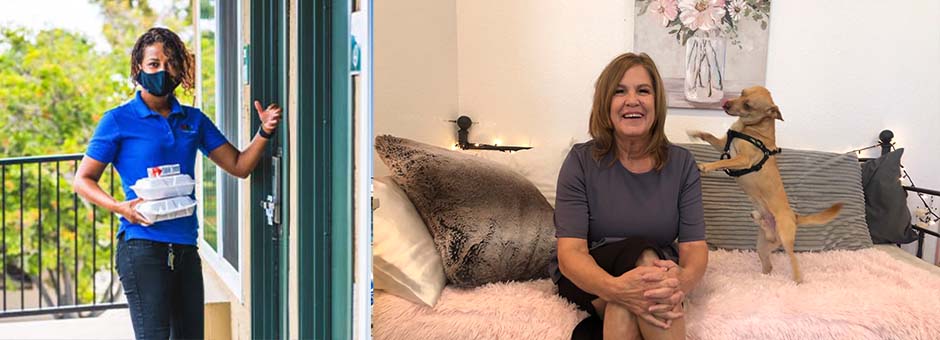
By Laura Nott, Live Well San Diego Support Team, on behalf of PATH San Diego
Homelessness in San Diego isn’t the first example of human suffering that Hanan Scrapper has encountered. She saw it growing up, too.
“You can’t unsee it,” said Scrapper, regional director of PATH San Diego. “We are in a wealthy country, but you still have people suffering on the streets and dying on the streets.”
San Diego is experiencing an intractable housing shortage and nowhere is it more evident than on the streets of downtown, where the homeless population continues to grow at an alarming rate. According to the Downtown San Diego Partnership, 1,839 people were homeless in downtown San Diego in December 2022, up from about 1,700 in November.
PATH, an acronym for People Assisting the Homeless, provides temporary financial aid and case management services to help the unhoused find their way into permanent shelter. PATH also helps the homeless with life skills, finding work, managing their money, and applying for mental health benefits and other medical services.
PATH began operating in San Diego in 2013 with the opening of Connections Housing, an integrated service and residential community downtown. PATH now provides interim and affordable housing and critical services countywide, including 24 programs and five supportive housing sites.
'Woman of the District'
For Scrapper, helping the vulnerable has been her life’s work. Before coming to San Diego, Scrapper worked in Virginia, first with people seeking asylum from countries damaged by war or escaping from politically motivated torture, she said, and later with homeless families and victims of domestic violence. In San Diego, she served as director of Veteran Housing Solutions at Veterans Village of San Diego before joining PATH. In 2022, Hanan was recognized as a “Woman of the District” by State Senate President Pro Tempore Toni Atkins. Scrapper also chairs the Regional Taskforce on Homelessness’ Ad Hoc Committee on Addressing Homelessness Among Black San Diegans.
PATH works on a “housing-first” basis, which means that getting a roof over someone’s head is step one. Without that, making oneself presentable and getting to work on time is difficult, Scrapper said. PATH will pick up part of their clients’ rent until they are able to fully take over. Those who are unable to work can receive permanent supportive housing, but still must put 30 percent of their income toward rent.
“Our overall goal is to get people into housing as quickly as possible,” Scrapper said. “We then provide wraparound services so they can work on stabilizing.”
A shortage of affordable housing has made PATH’s work onerous. People may get $1,000 in disability payments every month, she said, but finding housing with that income, and also paying for food and other daily needs, isn’t realistic. In addition, rent increases have now spread the pain to people who have homes but are being priced out of their units.
When affordable housing buildings are full, there is nowhere to go.
“We’re seeing seniors becoming homeless at a higher rate than before,” Scrapper said. “We need to build more affordable units and more permanent supportive housing. We’re at a humanitarian crisis at this point.
“Today, only those who are truly vulnerable with a high-enough acuity are being prioritized to get into housing. If you’re kind of in-between, it takes longer. It’s unpredictable. You can’t create a very realistic expectation because you don’t know when the housing opportunity might be available.”
Among the benefactors of PATH’s work is Tami Menard, a senior who has been homeless on and off for most of her life. Today is “really good,” said Menard, who, as a child, had been in the foster care system. She eventually married, but when her husband was sent to prison, she filed for divorce and began renting rooms for a few hundred dollars a month. After the money ran out, she moved to her car and was living there when her son gave her a card for a team member at PATH. Once she connected with PATH and the San Diego Housing Commission, she was put on a waitlist for the Ivy Senior Apartments. Menard and her rescue dog “Baby” moved into their new home more than a year ago.
As for Scrapper, her life’s journey took her in early December 2022 to Washington, D.C., to testify before the House Committee on Veterans' Affairs about PATH’s veteran-specific program, which takes a trauma-informed approach, focusing on mental health and substance use. A grant allows PATH to operate 40 beds for veterans who don’t yet qualify for permanent housing but allows them the flexibility to stay in the beds while they receive mental health care. Scrapper testified about the program’s success and the need for continued funding.
Scrapper calls homelessness a “community issue” and says that “we all have to work together” to make things better.
“Ever since I started my career, this is what I’ve done and I really enjoy it -- even though it doesn’t always have happy endings.”
Find Your Path Home
PATH provides the support that homeless individuals and families need to successfully transition from living on the street, or in shelters, to thriving in homes of their own. High-quality supportive services are critical to ensuring that the people PATH serves are able to not only move into permanent homes, but also stay in their new homes long-term.
The services PATH provides are available to individuals, families, and veterans who are homeless or at risk of becoming homeless. The individuals PATH serves have an array of unique experiences and PATH aims to tailor its service delivery to be able to address each person’s goals to make it home.